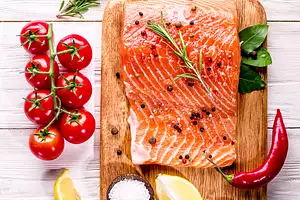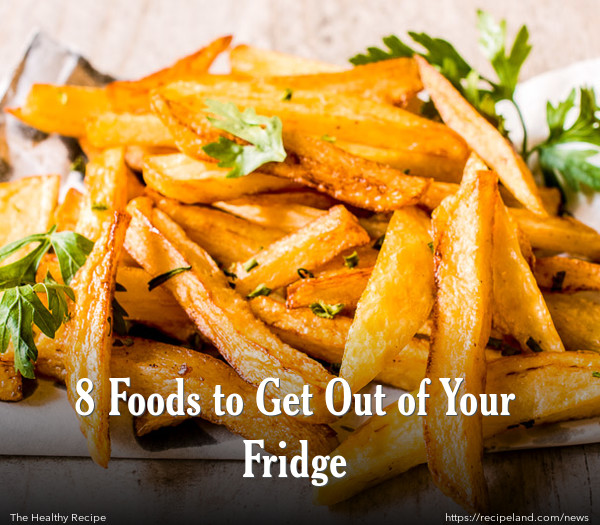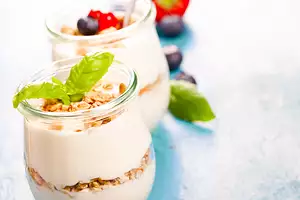Although many people use their refrigerator mainly to store those foods that must remain chilled, and think of them as generally healthy foods like fruits and veggies. If you open your refrigerator or freezer, you are highly likely to find some or all of the foods on this list. Foods that are minimally or not processed will require refrigeration—but this doesn’t mean that all perishables are good for you. It can be a huge sabotage to your diet when you are eating more of the foods that are labeled a “healthy” but not really as healthy as you think.
Fortunately, there is a solution. When you know which foods are the worst offenders, you can make more of an effort to avoid them. Sarah Krieger, RD, and spokesperson for the Academy of Nutrition and Dietetics, states, “If you don’t have it in the house, you’re not going to eat it, simple as that.”
Here are 7 foods that might be hanging around in your fridge or freezer, that you should avoid.
1. Low fat milk and yoghurt
Although healthy fats are good for you, like the kinds found in avocados, nuts, and oils, it can be tempting to reach for the low-fat dairy products, too.
But, new research from Tufts University, published in Circulation, showed that people who consume full-fat dairy products had a nearly 50% lower risk of developing diabetes over a 15-year study, compared with those who consumed low-fat dairy products. Another study showed that people who ate more high-fat dairy had a decreased risk of obesity compared to those who opted for low-fat versions.
Choose whole milk and full-fat yoghurt versions, which will not only taste better, but keep you more satisfied and eventually lead to lower calorie intake when you are not snacking as much.
2. Frozen vegetables with sauces
Keeping frozen veggies on hand is a terrific way to make sure you are adding your greens to each meal, without having to run to the store every day for fresh produce. And, frozen vegetables, according to Krieger, “are often frozen close to the farm. The transit time is shorter so more nutrition is sealed in that bag.”
But, when you pick up the versions that contain added sauces and flavourings, you are consuming far more fat and sodium than if you added your own butter and spices at home. Buy the plain varieties and drizzle olive oil over them, and add the spices and flavours you like to keep the veggies on the healthy side.
3. Mayonnaise
Whether you love it or hate it, there is often a jar of mayonnaise in every refrigerator. At 100 calories per tablespoon, mayo will quickly turn even the healthiest dishes into caloric disasters.
If you don’t mind mustard, it is a great alternative that adds a lot of flavour. If you really love the creamier texture of mayo, then try using a pesto spread that is made with heart-healthy olive oils instead.
4. White bread
You may have grown up thinking white bread is a staple for sandwiches and toast. But, because white bread is made with refined flour, and this flour has been stripped of the bran and the germ (which contain the key nutrients found in whole grain products), there is little to no nutritional value to white bread.
Eating whole grain breads are better for you in many ways, including helping with weight loss, lower mortality rates, less risk of cardiovascular disease. Just be sure that the products you buy say 100% whole grains on the label.
5. Processed meats
According to the World Health Organization, processed meat is carcinogenic. After evaluating more than 800 studies on meat and cancer, it was found that curing or smoking meats can cause the formation of cancer-causing chemicals in the meats.
In addition, processed meats have up to 1,000mg of sodium per serving, which is about half of the recommended daily intake. Krieger states, “Hot dogs and luncheon meats are so high in sodium, I cringe when I see their labels.”
Research conducted at Harvard University showed that those who at 1.8 ounces of processed meat per day increased their risk of developing heart disease by more than 40%. If you really love to eat deli meat, then you can buy the varieties that have no added nitrates or sodium.
6. Soda
In one can of regular soda, there are about 140 calories and 10 teaspoons of sugar. This is not really the best way to quench your thirst. Diet soda may be even worse for you.
A study conducted by the University of Iowa showed that people who drank two or more diet drinks per day increased their risk of developing heart disease by about 30%. Those who drink soda regularly are 50% more likely to develop heart disease. Instead of soda, reach for water, fresh juice, or iced tea. Make sure you are drinking only small servings of juice to keep your sugar intake in check.
7. Ice cream
Ice cream does make for a delicious treat. But, when full-fat ice cream contains 150 calories in a half-cup serving, it can be super easy to overindulge by consuming 2-3 servings at a time.
Krieger states, “Ice cream can be a trigger food. So if ice cream is your dessert or snack of choice, buy individual containers for portion control.” For a great treat that is healthier, freeze containers of plain regular or Greek yoghurt for dessert, and you can top this with fresh fruit or a few of crushed cookies.
8. Frozen fries
Just because you make the French fries at home doesn’t mean that they are better than the ones you get at the fast food places. Krieger explains, “Most frozen potato products are flash fried. The fat and salt contents are higher than if you did it yourself.”
A study conducted at Harvard University found that eating French fries was more consistently correlated with weight gain than any other foods. If you really need French fries, make some from scratch at home by cutting up potatoes and leaving the skins on (the skins contain more than 60 different phytochemicals and vitamins), add some olive oil and a little salt, and bake them in the oven.
Keep these foods out of your fridge and make it easier to stick to your healthy eating habits. If you must have these, then make sure you are only eating small amounts occasionally.










Comments
I didn't see any explanation in the soda category as to why diet soda would lead to an elevated risk of heart disease.
Soda gets a bad rap and maybe the people drinking more than 1 a day should cut back, but there's nothing wrong with a soda now and then.
Calories from all sources count. Calories from soft drinks are no more unique than calories from food. Soft drinks are not a unique risk factor for heart disease, or other complex health conditions for that matter.
Our industry is committed to being part of real solutions to public health challenges. We are helping people manage their calorie and sugar intake by providing a wide range of beverage options, a variety of package sizes and clear, easy-to-read information to help them make the choice that's right for them. And with our latest initiative - Balance Calories - we are working toward a common goal of reducing beverage calories in the American diet by 20 percent nationally by 2025.